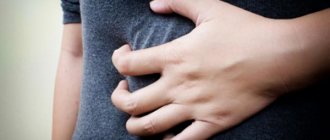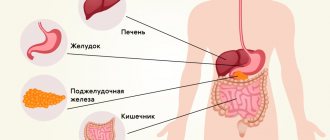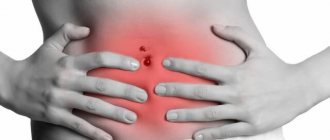For both adults and children, poisoning is a difficult ordeal. In the realities of modern life, there is practically no way to insure against this, but a proper diet will help to fully cleanse the body and recover faster. Today’s article contains information about what causes poisoning, instructions on what you can eat after poisoning and vomiting, and what diet will be most effective in such cases.
Poisoning with vomiting greatly weakens the body
Symptoms of poisoning
Food poisoning always develops according to the same scenario. In the abdominal area, discomfort first occurs, developing into severe pain and cramping. All this is accompanied by nausea, dizziness, vomiting or the urge to vomit.
Important! If the usual symptoms are supplemented by a high temperature, there is no need to hope that everything will somehow work itself out. Call an ambulance immediately! There is a high risk of death with improper treatment or lack thereof, when it is not a simple mild digestive disorder, but, for example, botulism.
Causes of food poisoning
Children are much more susceptible to digestive system disorders, so it is extremely important to constantly monitor them and instill in them healthy habits. They get poisoned not only from bad food, but also from trying to put dirty fingers in their mouths. From early childhood, they should understand that they must always wash their hands thoroughly with soap - not only before eating at the table, but also on the street. In adults, the most common causes of poisoning with vomiting are the consumption of foods:
- without following processing rules;
- overdue;
- improperly stored;
- poorly washed;
- undercooked and undercooked.
Attention! Street food and fast food remain among the leading sources of poisoning. Never agree to dine in places where there is even the slightest hint of unsanitary conditions and non-compliance with technological processes for preparing food. Take care of yourself and your loved ones!
Signs of dysbiosis
When the acute phase of poisoning passes, some symptoms remain indicating indigestion. A change in the normal intestinal microflora in quantity or quality is called dysbiosis. It is characterized by the following features:
- loose stools;
- constipation;
- bloating;
- unpleasant smell of feces;
- poor digestion of food;
- mild pain in the abdomen.
Dysbacteriosis can develop after the use of antibiotics and other antibacterial agents.
How to eat during poisoning
At such a time, any thoughts about food seem blasphemous. When the intestines are upset, it seems that there is no time to eat, but eating correctly during poisoning will help you recover much faster. At the first unpleasant symptoms, a sick adult or child should go to bed. Without unnecessary movements, it is much easier for the body to fight the infection that has appeared in it.
Important! In case of poisoning, the main task is to quickly remove harmful substances. Our bodies are trying to cope with this on their own, but let's help them by drinking plenty of fluids. In case of nausea, water helps the stomach to cleanse itself of remaining fragments of bad food.
Proper drinks for poisoning with vomiting
Drinking plenty of fluids during food poisoning is not all equally beneficial. We exclude broths, coffee, soda, and dairy products. Regular drinking water works best. Green teas and decoctions of herbs and rose hips have a healing effect; in addition, sick adults and children are prescribed the following:
- Pay attention to the effectiveness of rice water for poisoning. It is prepared from a glass of rice and several glasses of water without any additives. The rice is strained and only the broth itself is drunk. It quickly relieves vomiting and diarrhea, cleanses the body of harmful toxins.
- If the rice decoction itself causes nausea, you can replace it with a chamomile or mint decoction.
- The most common table salt will help stop vomiting attacks. Dissolve one spoon of salt in a cup of boiled water and drink this salted water often, but in small sips.
- Sugar-free pear compote will help soothe the intestinal mucosa. Pear decoction is prepared only from dried pears or quinces and without any additives.
- If you have pomegranate in your house, know that it is a wonderful remedy for intoxication. All you need is its peel, which is infused in boiling water for 15-20 minutes and consumed as often as possible.
Therapeutic diet after poisoning
Even if the intoxication was mild and the digestive organs were able to recover very quickly, the liver still struggles with the consequences of poisoning for some time. The main function of the liver is to filter beneficial and harmful substances that enter the human body. Some harmful toxins may accumulate in the liver. Unfortunately, this organ cannot always be cleansed of harmful elements.
That is why it is necessary to carefully select a therapeutic diet. Fried foods, very salty, over-smoked and very fatty, are harmful to the liver. Therefore, during the period of recovery of the body, it is necessary to avoid heavy foods.
Cereal porridges are ideal foods for the liver.
Recovery diet
While the body is cleansing itself, it has no time to eat. When relief comes, it’s time to think about what is the smartest thing to eat after poisoning and vomiting. The first meals should be in small portions and between them you need to listen to yourself to understand whether everything is normal in the body. The first meal may consist of:
- a few tablespoons of chicken broth;
- liquid porridge from buckwheat or rice, which are prepared in water without any additives;
- cups of warm sweet tea with a few crackers;
- semi-liquid mashed potatoes.
Attention! In order to recover quickly from an illness, it is unacceptable to immediately put too much strain on the stomach and other internal organs. Doctors recommend large amounts of strong tea or plain water and food in a liquid or semi-liquid state.
Boiled meat can be consumed within a few days after poisoning.
At first, it is strictly forbidden to consume:
- any heavy food;
- fatty foods;
- any sweets and baked goods;
- pearl barley, barley, millet porridge;
- canned food, sausage;
- grilled meat;
- coffee, cocoa;
- hot, spicy dishes;
- eggs, legumes;
- whole milk;
- chocolate, nuts, dried fruits in dry form;
- raw fruits and vegetables.
What can a child eat after vomiting? You can give pureed food, the main thing is to give it little by little and often. Rice porridge is recommended, but not milk porridge, weak chicken broth or jelly. It is good to eat boiled chicken breasts when on a diet. It is best to steam the chicken and then thoroughly grind it in a blender.
Important! In order for the recovery process to take much less time, you must strictly follow all medical instructions. All non-prohibited foods should be consumed with caution. After recovery, it is advisable to also undergo treatment with probiotics to restore the intestinal microflora.
Recovery
The treatment is designed to help relieve the toxic effects of bacteria, free the body from poison and restore damaged cells. You can restore your stomach after poisoning using a number of measures. No one can say for sure how long this will take. Medicines will help put the damaged organ back into action. But for recovery, it is recommended to reduce the amount of medications. Doctors recommend using folk remedies, prescribing a certain diet and physiotherapeutic procedures.
Drug therapy
You cannot self-prescribe medications. Such actions can easily provoke re-poisoning and internal bleeding.
The following drugs can normalize the functioning of the stomach:
- A complex of sorbents helps remove toxins from the body - activated carbon, Smecta, etc.
- Painkillers and antispasmodics should be taken to relieve pain - No-shpa, Spazmalgon and others. You can't drink Analgin.
- Enveloping drugs stimulate the restoration of organ walls - Maalox, Almagel, etc.
- Probiotics normalize the microflora, eliminate the consequences of diarrhea and vomiting - Hilak-Forte, Linex, etc.
- Enzymes are prescribed when food is not digested, there is a high load on the pancreas - Festal, Mezim-Forte, etc.;
- Prokinetics are designed to stimulate peristalsis, the motor function of the stomach.
Physiotherapeutic procedures
Physiotherapeutic treatment will help make the stomach work in a normal rhythm. Rehabilitation with these procedures will take place in a short time - tissue regeneration occurs faster, pain is reduced and gastric motility is restored.
The most commonly used procedures are:
- The use of drugs with electrophoresis helps to act on the damaged organ in a gentle way and stimulate cell regeneration.
- Magnetotherapy affects the immune system and connective tissues of the gastrointestinal tract.
- Laser therapy allows you to treat a diseased organ using a targeted method.
- Galvanotherapy will help improve the functioning of the stomach.
- Balneological procedures and massage relieve pain.
Traditional medicine
To ensure that the digestive organ works in a normal rhythm, you can use folk recipes. For recovery it is recommended:
- Infusion of parsley, flaxseeds and caraway seeds;
- Oatmeal jelly;
- Rice broth;
- A decoction of dill seeds and birch mushroom;
- Milk with clove umbrellas.
To normalize the microflora of the gastric tract, Elena Malysheva recommends drinking medicinal green teas and a separate mixture called “Monastery Tea.”
Doctors recommend herbal teas for recovery:
- Chamomile;
- Melissa and barberry;
- Thyme and plantain also have a good effect on microflora;
- Hops, dandelion and calamus root are useful.
It is recommended to drink herbal teas and infusions for a month. Folk remedies should be handled with caution. Some herbs can be harmful to health. Be sure to consult with your doctor. You should select the herbal mixture carefully and drink it on the recommendation of a specialist. Frequent walks in the fresh air are useful for recovery.
Prevention of poisoning
There is no need to treat digestive disorders as ordinary cases of our life. No one is immune from an unpleasant accident, but frequent occurrences should make a person wonder why this happens to him.
Attention! Not only low-quality products and water are responsible for this, but also basic failure to comply with the rules of personal hygiene can lead to constant poisoning of the body with severe nausea, vomiting, diarrhea and general weakness.
Personal hygiene is an important step in the prevention of poisoning
There will be much fewer cases of food poisoning if you follow the following simple but very effective rules:
- In most cases, we wash our hands after using the toilet, but what about those situations if you had contact with an animal (even a pet)? Don't forget to clean your hands every time you want to pet your four-legged pet.
- Animals are not allowed in the kitchen while food is being prepared.
- Be sure to thoroughly wash your hands with soap before each meal.
- A housewife should have different boards for cutting meat, fish or bread products.
- After cutting up meat, it is important not only to wash your hands conscientiously, but also to thoroughly wipe and rinse all surfaces involved in preparing food.
- All fruits and vegetables are washed in running water, and if possible, doused with boiling water.
- We process potentially dangerous food much more carefully.
- If you are preparing fish, you should not allow it to be served undercooked or undercooked.
- Any type of canned food cannot be opened without washing the outside of the can with a hard sponge and some dishwashing detergent.
- Raw foods and already prepared dishes are stored according to their storage conditions and always separately.
Note! If you have rotten or partially moldy food, get rid of it without regret. They are already undergoing disease-causing processes, and even high-quality cleaning of them will not save you from possible poisoning.
It is better not to allow the consumption of poor quality food, water, or expired products, than to suffer later and have to think about how to eat properly and what you can eat after vomiting in case of poisoning. Take care of yourself and be sure to teach your children the basics of safe nutrition. Be healthy!
In case of poisoning, the entire digestive system suffers, so an adult patient or child is prescribed not only drug treatment, but also diet therapy.
After detoxification, the doctor must eliminate the main cause of poisoning.
Diet therapy
More often, in case of poisoning, the mucous membrane of the stomach and other organs of the stomach suffers. Before deciding what the patient can eat, the doctor identifies the causes of poisoning:
- non-compliance with expiration dates of consumed products;
- lack of preliminary heat treatment and washing of vegetables.
To prevent poisoning, you should not eat raw meat or meat with blood, or raw fish. Against the background of poisoning, a strong decline in immune defense occurs.
After it, you need to cleanse the body of toxins, restoring its functionality.
After intoxication, food is not digested and absorbed fully, so it is necessary to adhere to some dietary restrictions. If you eat properly, without overloading the body, you can quickly restore the functioning of the gastrointestinal tract.
The goal of diet therapy after poisoning is to restore the mucous membrane. Gastroenterologists include the following general rules for eating after poisoning:
- on the day of poisoning you need to drink water;
- on the 2nd day you can eat puree and broth;
- You can’t eat meat, dairy, or spicy foods;
- The patient's main food is boiled vegetables;
- in the first days you can eat vegetable broth;
- after poisoning, you need to cook porridge only in water;
- Do not eat excessively cold or hot food;
- It is recommended to eat in small portions, with a gradual increase in their volume;
- you can eat dry cookies;
- in case of poisoning, fractional feeding of the patient is indicated.
If you follow the above recommendations, relief will come as soon as possible. If the symptoms of intoxication have disappeared by the end of the first day, you can eat crackers and low-fat broth.
For prolonged diarrhea, it is necessary to include in the diet a decoction of St. John's wort, as well as other products with an astringent effect on the gastric mucosa.
Compliance with herbal medicine
After poisoning, it is recommended to use some herbal medicine methods. This treatment is effective if the patient has no contraindications to taking folk remedies and is not allergic to herbs.
If intoxication appears, it is recommended to prepare a medicine from chamomile, mint and St. John's wort. Herbs are taken in equal proportions, pouring them with a liter of water.
After 10 minutes, the medicine is ready for consumption. It is drunk in small sips, every 12 minutes.
Modern gastroenterologists advise not to eat on the day of poisoning. During this period, you are allowed to drink herbal composition. When you have an appetite, you can eat crackers or hard bread.
On the 2nd day after intoxication, you can drink weak tea with lemon, but without sugar.
Since lemon contains vitamin C, the body will quickly recover. If two fasting days are observed, the patient’s diet includes rice water and products with bifidobacteria.
When you have an appetite, you can eat foods that nutritionists and gastroenterologists include in gentle diets. In this case, the patient must comply with the following rules:
- eating food in minimal quantities;
- eating food in liquid or semi-liquid form;
- refusal of food that provokes fermentation in the intestines.
Diet therapy will reduce the load on the gastrointestinal tract and restore its functioning. If there is no appetite after poisoning, drinking plenty of fluids and fasting is recommended.
This method of therapy simultaneously prevents dehydration. If this is followed, the patient will recover quickly.
Review of medications for restoring intestinal microflora
Probiotics and prebiotics will help restore intestinal microflora. Medicines are prescribed by a doctor; purchase them in advance at the pharmacy.
| Medicine | Pharmacological group | Features, method of application |
| Linex | Probiotic | Prevention of dysbiosis, helps improve intestinal function by replenishing the amount of normal microflora. Dosage: for children under 12 years old – 1 capsule 3 times a day, for children over 12 years old and adults – 2 capsules 3 times a day. |
| Bificol | Probiotic | Contains live bifidobacteria and has an immunomodulatory function. Launches restoration processes in the stomach. Suitable for chronic dysbacteriosis, after-treatment of intestinal infections. Dosage - depending on the disease and age of the patient. |
| Bifidumbacterin | Probiotic | Indications for use: dysbacteriosis, prevention and treatment of infectious intestinal diseases. Take orally during meals. |
| Lactusan | Prebiotic | Promotes the removal of toxic substances in cases of dysbacteriosis, constipation, colitis, toxicosis of pregnant women. Taken to prevent salmonellosis. In childhood, the dosage per day is 10 ml. (divided into 2 doses), for adults – 20 ml./day. |
| Prelax | Prebiotic | Taken for constipation and the need to cleanse the gastrointestinal tract by softening the stool. The main component is lactulose syrup. |
| Hilak Forte | Prebiotic | Restoration of microflora, water balance and normal stomach acidity. Taking the drug for more than 2 days is possible after consulting a doctor. |
The drugs are taken during pregnancy and lactation, and in childhood from birth. Contraindication: allergic reactions.
To restore microflora, eat sauerkraut, black bread, bran, fresh vegetables and fruits, fermented milk products with live microorganisms.
The restoration of intestinal microflora after poisoning will be faster if you use traditional methods together with medications: drink decoctions of chamomile, rose hips, and strawberry leaves. On the third day after poisoning, chicory decoction will help restore digestion and appetite.
Food selection
To quickly recover after poisoning, restoring the body’s previous strength, the patient can eat:
- steam cutlets for 3 days;
- casserole;
- soufflé and curd pudding;
- soups;
- biscuits without cream;
- baked vegetables;
- crackers;
- steam omelette.
On the 8th day of diet therapy, fermented milk products rich in bifidobacteria can be included in the patient’s menu. These products are necessary to normalize intestinal microflora.
From fermented milk products, it is better to drink homemade yogurt, kefir, yogurt and fermented baked milk.
In case of poisoning, the patient must adhere to the drinking regime. To prevent hypovolemic shock, drinking plenty of fluids is indicated. You can drink after each bowel movement and vomiting attack.
You need to drink in small sips. In this case, a drinking diet will help reduce intoxication, promoting the rapid removal of toxins.
In case of poisoning, patients should follow the following drinking diet:
- drinking only clean water;
- optimal consumption of saline pharmaceutical solutions, including Regidron. These compositions well normalize disturbed electrolytic and salt balance. You can prepare such a solution yourself. This will require salt and water;
- Any liquid is consumed in small sips and slowly. In this case, a break of 15 minutes is observed between doses;
- volume of liquid drunk per hour – 200 ml;
- the patient is allowed to drink green tea;
- dill decoction.
ethnoscience
In order not to cause severe intoxication, after poisoning, traditional medicine can be used along with drug treatment. Such recipes quickly relieve weakness and fatigue. Healing herbs can restore intestinal microflora and liver function.
- Cinnamon is considered a natural antispasmodic and sorbent. Ground cinnamon is used to prepare the infusion. 0.5 tsp substances are poured into one glass of boiling water. Infuse for fifteen minutes. Then filter and consume warm. Temporary admission is one day. The maximum daily volume is one and a half liters.
- The root system, flowers and leaves of marshmallow restore the intestinal microflora. The crushed substance in the amount of one teaspoon is poured with half a glass of boiling water. Infuse for half an hour, filter, add natural bee honey. Consume one tablespoon four times a day.
- Dill with natural honey helps remove toxins. 1 tsp dry dill seeds are poured with 1.5 cups of boiling water. Leave for 2-3 minutes. Simmer on fire for two minutes. Strain, add natural honey, consume in small portions throughout the day. The maximum daily volume is 1 liter.
- 1 tsp. dry wormwood and yarrow are poured into 500 ml of boiling water. Infuse for fifteen minutes. Strain and divide into five equal parts. Consume throughout the day.
- To prepare lemon water you will need three lemons, distilled water and natural honey. The ingredients are mixed together. The infusion is consumed throughout the day. Eliminates high acidity and the formation of gastritis.
Food restrictions
In case of poisoning, gastroenterologists identify foods in a separate group that patients need to avoid. Such food is poorly digestible.
This group includes:
- baking;
- sweets.
Due to such restrictions in food, the patient will be able to quickly recover from any poisoning. Heavy foods contain many harmful and unnecessary substances that will only aggravate the patient’s condition during intoxication.
At the same time, such food provokes high gas formation, pain, spasms in the stomach, provoking excessive stimulation of enzymes, causing fermentation.
It is allowed to prepare low-fat soup; it is better to give preference to vegetarian food. Honey is introduced into the menu on day 4, since fermentation processes are enhanced due to sweets.
It is forbidden to drink milk after the clinic in question. At the same time, you need to give up yogurt and kefir. They are included in the patient’s diet on day 5, provided the body is in normal condition.
Eggs cooked in any form are also prohibited.
Experts have differing opinions regarding bananas. Opponents of this fruit believe that it is too sweet and can provoke fermentation.
Proponents believe that bananas contain a lot of potassium, which is lost during intoxication. Also, bananas contain few fruit acids that can irritate the gastrointestinal tract.
Due to the above advantages and soft consistency, modern gastroenterologists and nutritionists include bananas in the diet of patients suffering from poisoning.
Recovery period in children
Children are poisoned quite often. This is due to the fact that they can grab and eat unwashed vegetables and fruits, constantly dirty hands, and also the desire to “taste everything.” For them, the issue of diet is especially acute, since it is impossible not to feed children for a long time, and the food must be nutritious and, if possible, tasty, otherwise the baby may refuse lunch.
The most suitable dishes for small patients are liquid porridges, light soups and small boiled pieces of rabbit or chicken. It will be especially difficult not to give your baby sweets. How to get your baby to eat? In order for him to not notice the absence of his usual food, you need to diversify the menu if possible or show creativity. For example, put the porridge on a plate in the shape of an animal or buy a plate with a cheerful design.
Video: how to stop vomiting and start your stomach?
Patient menu
Nutrition during intoxication:
- on the first day, hunger is indicated, but abundant consumption of herbal infusions and saline pharmaceutical solutions;
- on the 2nd day, it is recommended to drink up to 2 liters of liquid, consume broth, crackers, and puree up to 200 grams;
- on the 3rd day, prepare rice water, vegetable broth, cookies without cream;
- on the 4th day, chicken broth, vegetable casserole, steamed cutlets, and croutons are prepared;
- on the 5th day the patient is given boiled rice, chicken broth, crackers, and soufflé.
Preventive recommendations
To prevent poisoning and adhere to dietary therapy, it is recommended to follow simple preventive measures during cooking and in the kitchen:
- separate storage of raw and prepared foods;
- consumption of only high-quality water;
- maintaining cleanliness during the cooking process;
- using different boards and knives for food;
- cooking after washing hands;
- Foods that spoil quickly are recommended to be stored in the refrigerator at low temperatures.
If, while following the diet described above, the patient’s condition worsens, it is recommended to inform the attending physician.
The above products are included and excluded from the diet of patients who have suffered to varying degrees from intoxication.
The duration of diet therapy depends on the nature of the clinic. In case of severe poisoning, complete refusal to eat is indicated. Such patients require hospitalization.
They are given glucose to support the body. It is allowed to return to normal feeding 1-2 days after the attack.











